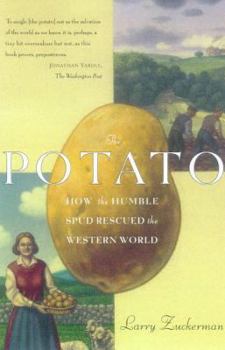The Potato: How the Humble Spud Rescued the Western World
Select Format
Select Condition 
Book Overview
"The Potato "tells the story of how a humble vegetable, once regarded as trash food, had as revolutionary an impact on Western history as the railroad or the automobile. Using Ireland, England,... This description may be from another edition of this product.
Format:Paperback
Language:English
ISBN:0865475784
ISBN13:9780865475786
Release Date:October 1999
Publisher:Farrar, Strauss & Giroux-3pl
Length:336 Pages
Weight:0.90 lbs.
Dimensions:0.9" x 5.5" x 8.4"
Customer Reviews
5 ratings
The Humble Spud in History
Published by Thriftbooks.com User , 22 years ago
With a lively literary style, journalist Larry Zuckerman explains the history and importance of the lowly tuber, from its thirteen-thousand-year origin on the high Andean plateaus to its sixteenth-century discovery by Spaniards down to the beginning of World War I. Zuckerman chronicles just four countries in his treatise about the spud, but these countries: France, England, Ireland, and the United States are, he says, representative of the Western world.Despite the potato's vital nutrients, it soon became known as the food of the poor and remained out of favor among the gentry. Even the peasants did not appreciate the strange plant that formed odd tubers which sprouted, which they declared to be of the Devil. But by the end of the seventeenth century, the potato as a staple food for Ireland's poor had become widely known. At the same time in England, the potato had yet to become a table food. Farmers fed them to their livestock. Within a hundred years, the potato had "nosed its way into English life." In France, where the fear of nightshades was even greater than in England, the potato caught on because the wet summers did not affect this hardy plant as they did grain.Zuckerman traces the tuber's history from its beginnings through the horrific Potato Famine of Ireland to farm staple in a post-Civil War U.S. The potato represented a food whose ease of preparation lightened the burden for the average American farm wife. In chapters titled Potatoes and Population, A Passion for Thrift, Women's Work, The Good Companions, and Good Breeding (showing the evolution of the tuber from exotic and fearsome to low class, to beneath notice), Zuckerman educates and entertains, and at the same time shows us that having read the history of the lowly spud, we can never regard it in the same way. Perhaps the humble potato did rescue the Western world.
Both great and disappointing
Published by Thriftbooks.com User , 24 years ago
While i really liked this book and found it full of useful information and insightful analysis, i also found the book very disappointing.I was disappointed by his treatment of the pre-Colombian aspects of the potato's history. We find out little about the origins of the potato, its importance and uses in pre-Colombian South America, etc. (They are part of the Western World) We also find little about the potato itself. The book is Eurocentric and just a social history. These are both shortcomings of the book and strengths.Zuckerman, who writes quite well, provides us with a tremendous social history of the potato in a few countries: France, England, Ireland and the US. The book ranges far and weaves a complex historical story with great explanations. Just the discussion on how social attitudes towards the potato is worth the cost of the book. I would recommend this book, but be forewarned that it is a limited social history.
The lowly spud?
Published by Thriftbooks.com User , 25 years ago
Nothing could be more boring than the potato. Well maybe not. Larry Zuckerman in the, Potato: How the Humble Spud Rescued the Western World takes the lowly tuber to new heights. Being of Irish and Anglo Irish extraction, the great famine has always struck a chord with me. I've read Ship Fever by Andrea Barrett which brings home the horror of the famine but I've always been a bit puzzled about it. It is hard living in the age of plenty to understand this event. Why not eat something else if the potato crop goes bad and skip the fries and just eat the Big Mac? Zuckerman's fine book explains the inner workings of the famine. A loaf of white bread could cost most of a days wages leaving nothing else for rent, clothes, or other necessities. The potato was a miracle crop. It would grow where most other crops failed. It was almost a complete diet and provided the much needed vitamin C. It was not labor intensive like grain and did not require an oven, which very few could afford. The book covers a lot more than the famine and is a wealth of detail about the lowly tuber. Ministers decried it and blamed the Irish population boom on its supposed aphrodisiac qualities. The potato was originally grown for beasts and by definition was unfit for humans. It was easy to grow so therefore encouraged laziness, thus confirming English suspicions. It was not mentioned in the Bible so add one more strike against it. The Potato is anything but boring. After you've read, it you'll never look at a potato the same way again. I'd love to see Zuckerman do the same treatment on rice.
clever, poignant and educational
Published by Thriftbooks.com User , 25 years ago
Never would I have guessed, before discovering Larry Zuckerman's book, that I could be so moved to laugh and learn while reading about a vegetable. His personal, palatable presentation of social history enlightened me with a truer understanding of my Irish roots(!), as much as it entertained.
#2 fast food choice USA market
Published by Thriftbooks.com User , 26 years ago
Potato is so versatile, It is #2 add-on at Fest Food chains, & superbly carved by chefs also. Should be supplemental reading all culinary school students... Will sell well in Idaho






